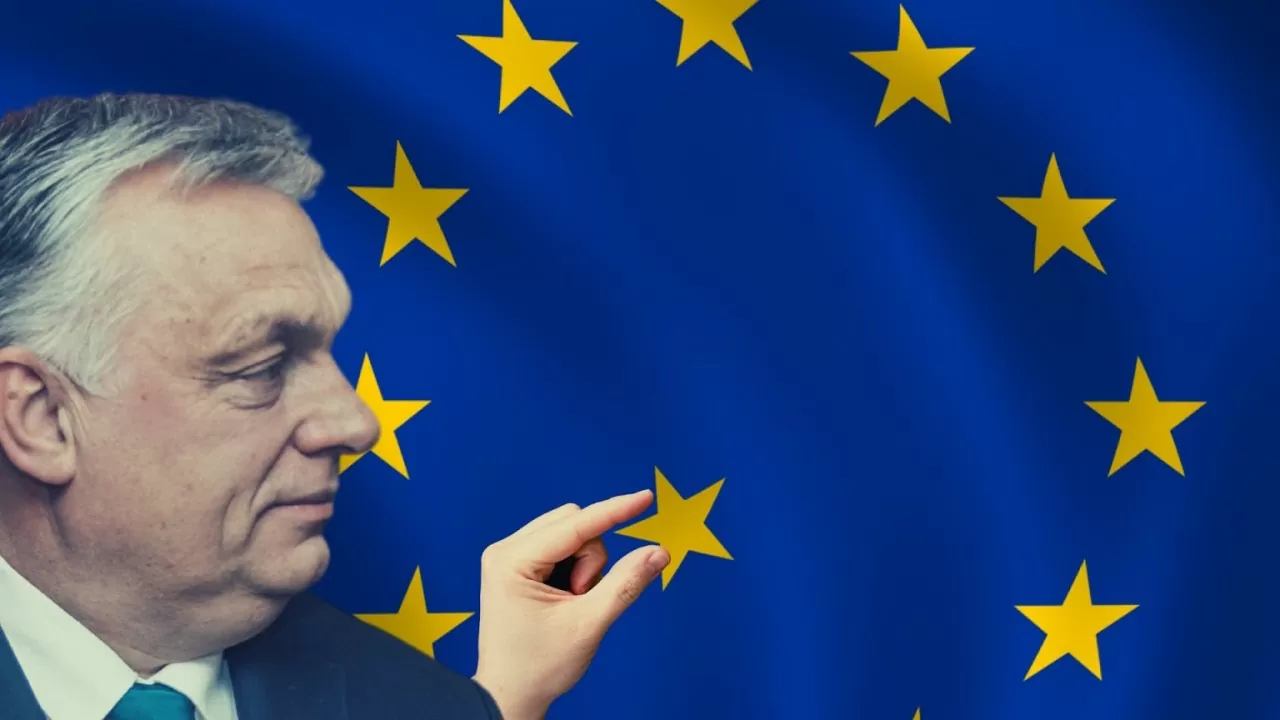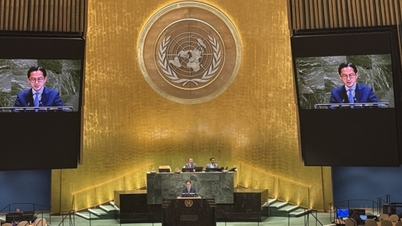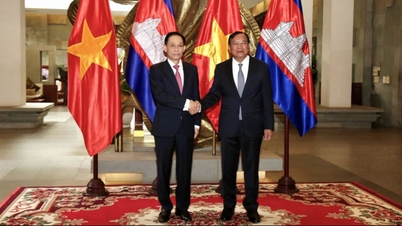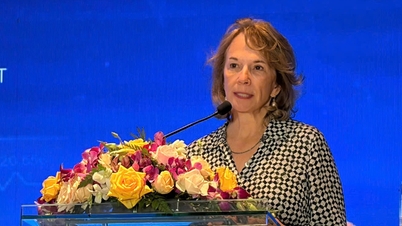Hungary's strained relationship with the European Union (EU) is exacerbating its economic difficulties.
 |
| Hungary's economy is being dragged into recession, and the EU is 'turning its back,' cornering Russia's European ally? (Source: visegradinsight.eu) |
In the third quarter of 2024, Hungary officially reported a 0.7% quarterly decline in GDP, following a 0.2% drop in the previous quarter. With two consecutive quarters of negative growth, Hungary has officially entered a technical recession. Meanwhile, weak industrial performance across a range of key sectors, from agriculture and manufacturing to construction, continues to impact the economic outlook of this EU member state.
Hungary is the only EU member to have maintained close ties with Russia since the Ukraine conflict broke out (February 2022).
Prime Minister Viktor Orbán's hopes
Will Hungary's unexpected economic downturn dash Prime Minister Viktor Orbán's hopes as the 2026 parliamentary elections draw closer?
Mr. Orbán is eager to boost growth again this year to best prepare for next year's parliamentary elections, but for now, the Hungarian economy faces many difficulties in returning to positive growth.
Recent reports indicate a close race is underway between incumbent Prime Minister Orbán and opposition candidate, MEP Péter Magyar of the Tisza party (Party of Respect and Freedom). Magyar's party has recently held a lead in opinion polls, surpassing the ruling Fidesz (Hungarian Civic Alliance).
Therefore, Prime Minister Orbán's government hopes to soon restart the recovery process for an economy currently teetering on the brink of recession. Of course, such an effort could face numerous challenges, as Hungary's industrial performance in 2024 has fallen so sharply that key sectors, from automotive manufacturing and electronics to pharmaceuticals, are all struggling with weak demand.
The most recent official figures show that output in many Hungarian industries is the biggest drag on growth. A report from the Hungarian Statistical Office indicates that the output of this Central European nation's economy fell sharply by 3.1% when calculated based on working days, while over the period from January to October, industrial output decreased by as much as 3.9% compared to the same period last year.
Analyzing the data, the Hungarian Ministry of Economy pointed out that the "complex" regional environment was the main reason for this inefficiency. Simultaneous economic recession in several European countries is putting pressure on and depressing demand for Hungarian export-oriented industrial output.
The most significant impact on the Hungarian economy is the "acute deindustrialization" occurring in its leading partner, Germany, where the region's number one automotive industry has been forced to cut production due to sharply declining orders and soaring energy prices following the outbreak of the Russia-EU conflict.
In fact, Hungarian manufacturers are heavily reliant on orders from German factories, and companies in the automotive sector are currently facing serious obstacles. An analysis by ING Financial Group published in early November 2024 showed that industrial production volume in Hungary was 4.8% lower than the average monthly output in 2021.
Thus, the sharp decline in demand is a major obstacle to the growth of Hungarian industry. In November 2024, the Dutch Central Bank also published a study showing that Hungarian industrial capacity continued to deteriorate in the fourth quarter of 2024.
“The combination of three factors: fragile domestic consumer confidence (which could weaken further as the local currency, the Forint, continues to depreciate), market caution, and sluggish business investment makes the economic outlook for Hungary even bleaker,” according to ING’s analysis. Accordingly, “Hungarian industry is almost certain to become a significant drag on the country’s GDP growth in 2024, which is likely to be only 0.5-1.0%.”
Announced on November 15, the European Commission (EC) estimated that Hungary could achieve only 0.6% real GDP growth in 2024, with an assessment that "slow investment is the underlying factor leading to this poor performance".
Specifically, the EC cited delays in planned public investments and weak business confidence as key factors affecting Hungary's economic growth over the past year; along with weak orders from key trading partners for its main exports, such as machinery and transport equipment.
The conflict continues to deepen.
Meanwhile, just as the new year began, Budapest received bad news when the EU "harshly" rejected over 1 billion euros in funding from the union's funds, citing its failure to implement the requested reforms. This is the first time such a decision has been made against a member state.
Like other countries in Central and Eastern Europe, Hungary previously received significant funding from the EU, which helped boost GDP growth and support its financial and debt figures.
However, since the end of 2022, the EU has blocked approximately 6.3 billion euros in aid to Hungary on the grounds of violating fundamental values and standards in force within the EU, with risks related to the public procurement system being a major issue. Consequently, the EC decided to permanently revoke Hungary's entitlement to 1.04 billion euros, as the agreement expired on December 31, 2024.
“If Budapest is unable or unwilling to meet the remaining conditions set by the EU for disbursement, Hungary could ultimately lose a significant amount of funding and low-cost loans,” Moody’s Ratings analysts stated when conducting a credit rating assessment and deciding to downgrade the economy’s debt outlook from “Stable” to “Negative” in late November 2024.
Moody's also warned that the funds frozen by the EU could dampen economic growth and exacerbate existing debt problems in this Central European nation's economy.
In response, Budapest asserted that such sanctions were the result of political disagreements with the EU, with Prime Minister Orbán seeking to pursue a more neutral economic strategy toward the union's rivals and the West, such as Russia and China.
Previously, the Hungarian head of government had also repeatedly criticized the bloc for its approach to electric vehicles, which he argued could potentially lead to an "economic cold war" with Beijing.
According to the Financial Times , in December 2024, Hungary's EU affairs minister János Bóka analyzed - "it is difficult" not to understand the withdrawal of grants as "political pressure", adding that Budapest will act to "overcome this discrimination".
In early December 2024, Hungarian Prime Minister Viktor Orban threatened to veto the EU's next seven-year budget if the bloc did not release frozen funds intended for Budapest.
The conflict continues to deepen, pushing EU-Hungary relations into what appears to be a confrontational stance, with escalating disagreements in an already complex relationship. Recent developments mark a new, extremely tense chapter, against the backdrop of the decades-long, unstable EU-Budapest relationship, with no end in sight.
Hungary has been accused by the EU not only of "violating the democratic and rule-of-law principles" of the bloc, but also of other issues such as military and financial support for Ukraine... Hungary, under the leadership of Prime Minister Viktor Orbán, has repeatedly disagreed with the alliance on important issues, particularly regarding its stance towards Russia and the conflict in Ukraine.
While the EU has imposed economic sanctions and visa restrictions on Russia, Hungary has maintained a more conciliatory stance toward Moscow and has repeatedly called for negotiations. Hungary's position has displeased some EU members, with some even calling for Budapest to leave the organization and form an alliance with Russia.
The "rifts" widened further when Prime Minister Orbán visited Russian President Vladimir Putin in Moscow in July 2024 while serving as the rotating EU President (June-December 2024). The conflict intensified when Orbán publicly expressed many opposing viewpoints between Budapest and Brussels. The Hungarian Prime Minister frankly stated that European citizens need peace, but "EU leaders want war."
The latest development is that Ukraine has suggested it is ready to "take Hungary's place" in the EU and NATO, after the Hungarian Foreign Minister criticized Kiev for shutting off the Russian gas transit valve, causing difficulties for many member economies of the 27-nation bloc. "If Hungary prioritizes strengthening relations with Russia instead of the EU and the US, Kiev will be ready to fill any vacant position...", the Ukrainian Foreign Ministry announced on January 8.
Budapest has not yet commented on Kyiv's suggestion. But despite the latest moves by the EU, the Hungarian head of government has repeatedly stated frankly that the main victims of the EU- and US-led Ukraine strategy are "the European economy and people," and that everything his government does is to protect the people and the economy.
Source: https://baoquocte.vn/kinh-te-hungary-bi-keo-xuong-vuc-suy-thoai-chau-au-quyet-quay-lung-don-dong-minh-cua-nga-den-chan-tuong-300841.html





























![[Video] The craft of making Dong Ho folk paintings has been inscribed by UNESCO on the List of Crafts in Need of Urgent Safeguarding.](https://vphoto.vietnam.vn/thumb/402x226/vietnam/resource/IMAGE/2025/12/10/1765350246533_tranh-dong-ho-734-jpg.webp)









































































Comment (0)